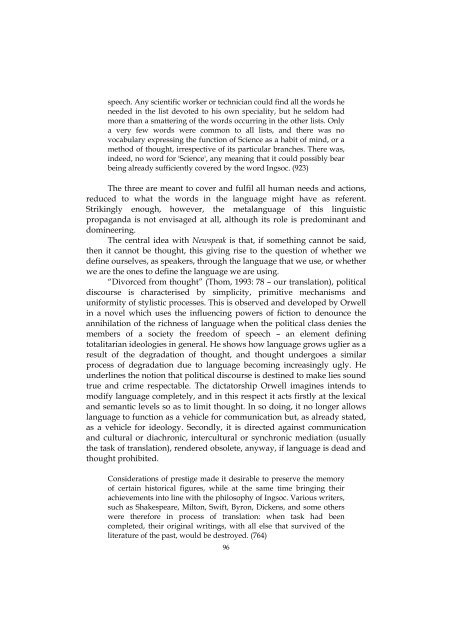translation studies. retrospective and prospective views
translation studies. retrospective and prospective views
translation studies. retrospective and prospective views
You also want an ePaper? Increase the reach of your titles
YUMPU automatically turns print PDFs into web optimized ePapers that Google loves.
speech. Any scientific worker or technician could find all the words he<br />
needed in the list devoted to his own speciality, but he seldom had<br />
more than a smattering of the words occurring in the other lists. Only<br />
a very few words were common to all lists, <strong>and</strong> there was no<br />
vocabulary expressing the function of Science as a habit of mind, or a<br />
method of thought, irrespective of its particular branches. There was,<br />
indeed, no word for 'Science', any meaning that it could possibly bear<br />
being already sufficiently covered by the word Ingsoc. (923)<br />
The three are meant to cover <strong>and</strong> fulfil all human needs <strong>and</strong> actions,<br />
reduced to what the words in the language might have as referent.<br />
Strikingly enough, however, the metalanguage of this linguistic<br />
propag<strong>and</strong>a is not envisaged at all, although its role is predominant <strong>and</strong><br />
domineering.<br />
The central idea with Newspeak is that, if something cannot be said,<br />
then it cannot be thought, this giving rise to the question of whether we<br />
define ourselves, as speakers, through the language that we use, or whether<br />
we are the ones to define the language we are using.<br />
“Divorced from thought” (Thom, 1993: 78 – our <strong>translation</strong>), political<br />
discourse is characterised by simplicity, primitive mechanisms <strong>and</strong><br />
uniformity of stylistic processes. This is observed <strong>and</strong> developed by Orwell<br />
in a novel which uses the influencing powers of fiction to denounce the<br />
annihilation of the richness of language when the political class denies the<br />
members of a society the freedom of speech – an element defining<br />
totalitarian ideologies in general. He shows how language grows uglier as a<br />
result of the degradation of thought, <strong>and</strong> thought undergoes a similar<br />
process of degradation due to language becoming increasingly ugly. He<br />
underlines the notion that political discourse is destined to make lies sound<br />
true <strong>and</strong> crime respectable. The dictatorship Orwell imagines intends to<br />
modify language completely, <strong>and</strong> in this respect it acts firstly at the lexical<br />
<strong>and</strong> semantic levels so as to limit thought. In so doing, it no longer allows<br />
language to function as a vehicle for communication but, as already stated,<br />
as a vehicle for ideology. Secondly, it is directed against communication<br />
<strong>and</strong> cultural or diachronic, intercultural or synchronic mediation (usually<br />
the task of <strong>translation</strong>), rendered obsolete, anyway, if language is dead <strong>and</strong><br />
thought prohibited.<br />
Considerations of prestige made it desirable to preserve the memory<br />
of certain historical figures, while at the same time bringing their<br />
achievements into line with the philosophy of Ingsoc. Various writers,<br />
such as Shakespeare, Milton, Swift, Byron, Dickens, <strong>and</strong> some others<br />
were therefore in process of <strong>translation</strong>: when task had been<br />
completed, their original writings, with all else that survived of the<br />
literature of the past, would be destroyed. (764)<br />
96












